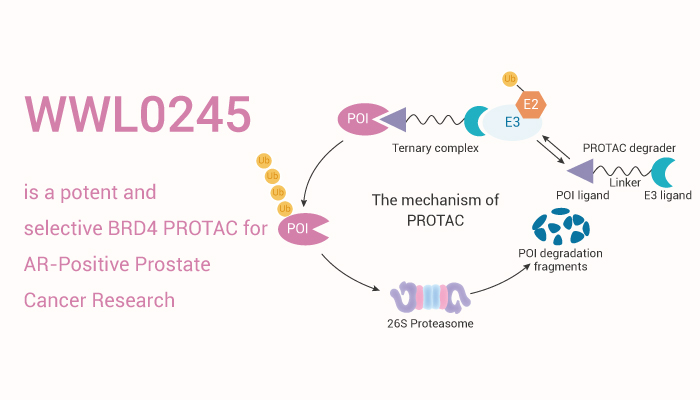Proteolysis targeting chimeras (PROTAC) is a bifunctional molecule that could draw an E3 ubiquitin ligase close to a protein of interest (POI) and induce its degradation via the ubiquitin-proteasome system (UPS). BRD4 is an important epigenetic “reader”. It can identify and bind acetyl-lysine residues of histones to regulate gene transcription, including different oncogenes in several types of cancers. BRD4-targeted PROTAC has exhibited promising in vitro and in vivo anticancer activity in a number of cancer models. Today, we will introduce a selective BRD4 PROTAC — WWL0245.
WWL0245 is a potent and selective BRD4 PROTAC.

WWL0245 selectively degrades BRD4 with sub-nanomolar DC50 (<1 nM). And it shows excellent selective cytotoxicity in the BETi sensitive cancer cell lines, including AR-positive prostate cancer cell lines.
Firstly, WWL0245 (0-1 μM; 96h) suppresses the proliferation of AR-positive prostate cancer cells with IC50 values ranging from 0.0159 μM -10 μM. Secondly, it shows greater antiproliferative activity to AR-positive cell lines VCaP, LNCaP, and 22Rv1 with IC50 values of 0.016 μM, 0.021 μM, and 0.053 μM, respectively. Thirdly, WWL0245 (1 μM; 24 h) results in the downregulation of BRD4 and c-Myc in a time-dependent manner in LNCaP, 22Rv1, VCaP cell lines and results in the decrease of BRD4 level and c-Myc level in a concentration-dependent manner in 22Rv1 and VCaP cell with DC50 of sub-nanomolar. Although WWL0245 could also downregulate BRD4 level in DU145 cells but has negligible effects on the c-Myc level.
Finally, WWL0245 (100 nM-1 μM; 24 hours) suppresses the transcription of AR-regulated genes at various degrees.
Reference:
[1] Rong Hu, et al. Eur J Med Chem. 2022 Jan 5;227:113922.